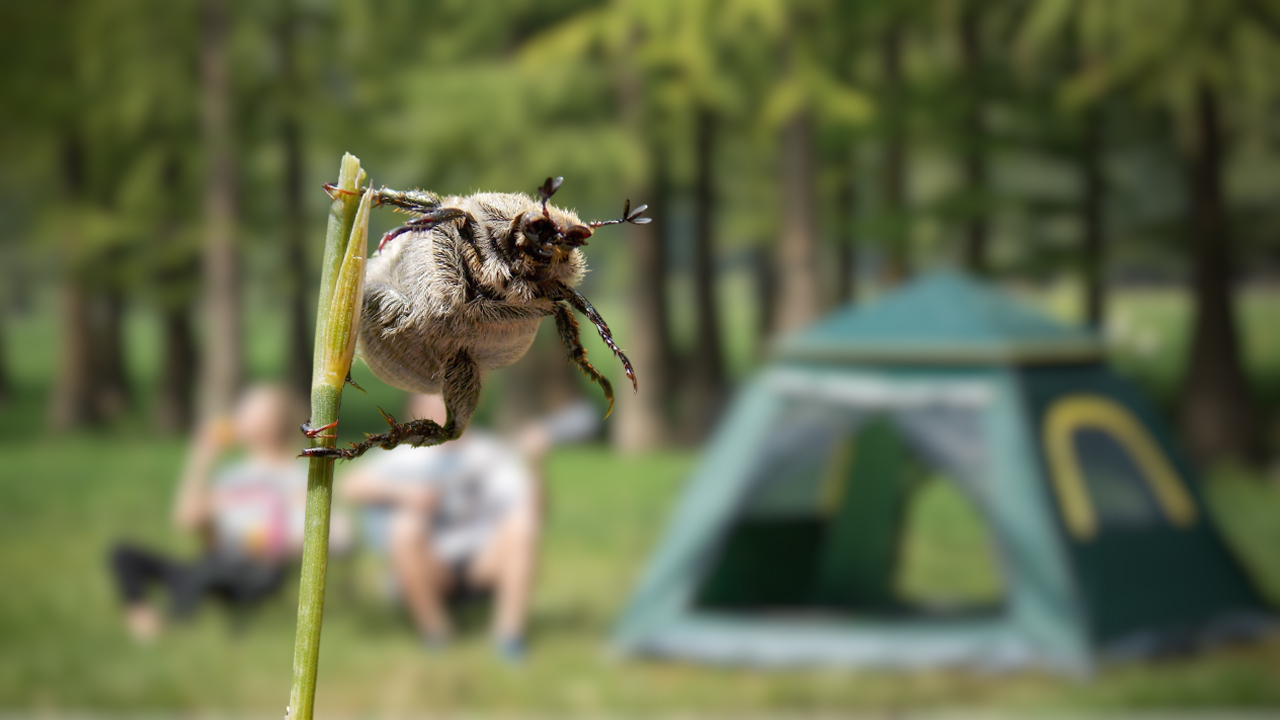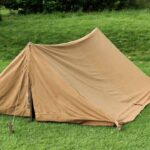If you love camping, you probably don’t love sharing your tent with bugs. Insects can be annoying, itchy, and even dangerous if they carry diseases or cause allergic reactions. Fortunately, there are some effective ways to keep bugs out of your tent and enjoy a peaceful night under the stars.
To prevent bugs around your tent, avoid dense vegetation, store food in sealed containers away from your tent, wash utensils after meals, employ red lighting, and avoid setting up near trash bins where bugs like flies congregate for food.
Now, let’s dive deeper into each strategy and explore some effective methods that many campers swear by to keep bugs at bay while camping:
Avoid Camping at Damp Place
Preventing bug woes should be a top priority right from the moment you arrive at your campsite. It begins with choosing the right pitch. Opt for a location far from any stagnant water sources, such as ponds, lakes, puddles, or drains.
Additionally, steer clear of pitches surrounded by damp, tall grass, a gathering spot for flies and insects.
While mosquitoes may seem like an inevitable part of summer, there are certain areas that attract more bugs than others. Specifically, watch out for locations with standing water, be it marshy terrain, soggy grass, or a nearby pond or lake.
Avoid Thick Vegetation
Steer clear of trees and areas densely populated with vegetation. These locations often trap moisture, hinder air circulation (which can help disperse insects), and produce pollen that can attract bees and wasps.
While trees, tall grass, and blooming flowers add to the natural beauty of the outdoors, they hold a particular allure for insects. These areas offer moisture, shelter, and pollen – everything bugs adore. However, they tend to obstruct the breeze, which might appear beneficial when lighting a campfire.
But in reality, a gentle breeze is your best ally in warding off bugs. While you can’t summon the wind at will, ensure that your campsite isn’t overly sheltered and seek out open space for your tent. This approach will help you enjoy a bug-free camping experience.
Zip Up the Tent
After selecting an ideal spot for your tent, the key to maintaining a bug-free interior is to keep the tent fully zipped at all times, even during the setup process. While it may be tempting to allow fresh air to flow through the tent during summer, a well-ventilated tent can provide ample airflow even when zipped up. This is especially achievable if you can keep the rain fly off.
The inner compartment of your tent serves as a crucial physical barrier against insects. The easiest and most effective method to keep these pesky intruders out is to ensure it remains securely zipped shut. Whether you’re making a brief trip to the restroom or grabbing your flashlight, always remember to promptly zip the tent door closed as you enter or exit.
Using Mosquito Nets
Tents come in various designs, and not all of them offer the same level of insect protection. If your tent lacks an inner mesh compartment, you have an alternative solution: hang a mosquito net over the entrance.
For enhanced effectiveness against mosquitoes and insects, opt for a net treated with chemical insect repellent. When searching for such a net, look for tents labeled as having an insecticide-treated net containing permethrin. This ensures added protection during your camping adventure.
Bug Spray Is a Must
When you’re getting ready for your camping adventure, don’t forget to pack bug spray. It’s your quick fix for dealing with any pesky bugs that might show up on you or your camping gear. Bug spray also provides extra protection against potentially harmful insects.
Now, let’s talk about mint. Bugs really don’t like the smell of mint, but we humans find it crisp and refreshing. So, here are some easy ways to keep that minty scent around your campsite:
- Place potted mint plants in different areas, especially where you gather.
- Enjoy some strong minty breath mints now and then.
- Use toothpaste or mouthwash with extra mintiness.
- Make your own minty spray by putting mint mouthwash into a spray bottle and using it around your campsite or on yourself.
And if you don’t want to rub smelly garlic all over yourself, there’s a simpler way to get its bug-repelling powers. Just take garlic capsules during your camping trip. This will make your body release a garlic scent that keeps insects away. Just keep in mind, it might also keep some people away too!
Avoid Fragrances
Bugs and insects are oddly fond of sweet-smelling fragrances, especially floral scents, making it crucial to steer clear of such scents both on your body and around your tent. While maintaining personal hygiene during your camping trip is essential, using strongly scented hygiene products or toiletries can inadvertently invite unwanted guests.
Surprisingly, bugs are just as drawn to these fragrant items as you are. Therefore, it’s best to avoid perfumed:
- Soap, Shampoo
- Air Freshener
- Colognes,
- Body sprays
- Perfumes
However, this doesn’t mean you have to forgo personal hygiene altogether. Consider opting for natural, unscented toiletries that are devoid of artificial fragrances or chemicals.
If you happen to be the only one in your group dealing with a tent infested by bugs, there might be a connection between the scented products you’re using and the insect visitors. Certain insects are attracted to fragrances, potentially leading them to follow you into your tent.
Camping Lights for Bugs
Campfire is more than just roasting hot dogs and making s’mores. The smoke generated by campfires can effectively repel unwanted guests like mosquitoes, flies, and other bothersome bugs. Moreover, any light source that emits a bit of smoke, such as tiki torches or candles, can have a similar bug-repelling effect.
For those seeking both illumination and bug control, citronella candles are an exceptional choice. The potent aroma they emit drives bugs away in search of greener pastures. You can easily purchase citronella tea lights and place them in jelly jars strategically positioned around your campsite. Not only do they provide ambient lighting, but they also act as an effective bug deterrent.
If you’re willing to invest in versatile lighting solutions, consider lanterns designed to double as insect repellents. These lanterns come equipped with cartridges that release chemicals detested by insects, effectively keeping them at a distance from the lantern’s vicinity. This smart combination of lighting and bug control ensures a more enjoyable camping experience.
Frequently Asked Question
- What can I use in my tent to keep bugs away?
Fresh and dried herbs like sage, rosemary, eucalyptus, and mint work well as natural bug repellents, in addition to essential oils.
- Is it safe to apply bug spray on a tent?
It’s not advisable to directly use regular bug spray designed for your skin on your tent, as certain sprays may harm the tent material. Instead, you can safely use a permethrin-based insect repellent on your tent and gear, applying it at least 2 to 4 hours before use. Additionally, ensure your tent is free of any holes or tears that could permit bugs to enter.
- How can I prevent spiders from entering my tent?
To keep spiders out of your tent, make sure to zip up all the mesh panels completely. Spiders and other insects can’t enter your sleeping area when the openings are sealed. Even minor gaps can provide access, so be thorough in inspecting and promptly closing any openings.
- What’s a natural bug repellent?
A natural bug repellent usually contains citronella or citronella oil from a plant called Cymbopogon nardus. It can help keep insects away, but how well it works can be affected by things like air quality and hot weather.

Robert Coleman, in one word is a multitasker. He enthusiastically works as an outdoor guide. He also has led large groups for backpacking at Bogota in Columbia. Hours of research and field experiences have helped him to stand as one of the best professional reviewers for anything related to outdoors. He improvises in using the right tool rather than packing tons of unnecessary things while outdoors.









Leave a Comment